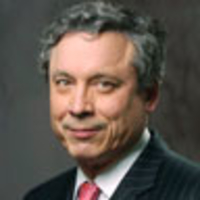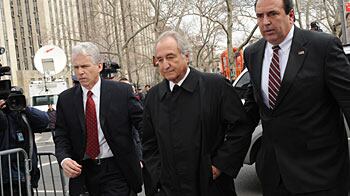
UPDATE: The appeals court decided Friday morning that Bernie Madoff must remain in jail until his sentencing in June. Yesterday, The Daily Beast's Allan Dodds Frank explored why prosecutors claim the 70-year-old fraudster might bribe his guards and flee.
UPDATE: Bernie Madoff’s chances of enjoying spring sunlight anywhere but inside a prison exercise yard went from slim to almost absolute zero Friday with a unanimous U.S. Second Circuit Court of Appeals order keeping him in the can. He will not be sunning himself in an ankle bracelet on his Manhattan penthouse terrace amidst those potted plants and shade trees that cost $800 in gardener’s fees a month.
"The defendant has a residence abroad and has had ample opportunity over a long period of time to secret substantial resources outside the country."
In its four-page order, the three judge panel ruled that Madoff’s lawyers had failed to present “clear and convincing evidence” that the 70-year-old swindler- faced with life imprisonment- is not a flight risk. During Thursday’s half hour of oral argument, Madoff’s lawyer, Ira Lee Sorkin, had argued that Bernie was entitled to $10 million bail and a return to house arrest at his $7 million east side penthouse until he is sentenced June 16 because he is neither a flight risk nor a danger to the community. The appeals court also put its seal of approval on Judge Denny Chin, who had wasted no time in locking up Madoff following his guilty plea March 12 to 11 felonies. From the bench Thursday, the appeals judges seemed to question the brevity of Chin’s findings, in the written order, the panel boiled its decision down to Judge Chin’s statement that once a defendant pleads guilty, he “is no longer entitled to the presumption of innocence.” Judge Chin’s findings, the court said, “were sufficient” –given Madoff’s age and the prospect of a 150-year sentence – to “inferring an incentive to flee.”
The appeals judges also said that Judge Chin did not have to accept the defense’s assertion that Madoff has turned over all his assets to the authorities. Noting Madoff’s apartment in the south of France, the appeals court ruling said, “The defendant has a residence abroad and has had ample opportunity over a long period of time to secret substantial resources outside the country.” Perhaps signaling the futility of further appeal by Madoff, the appeals judges said they also could have kept him in prison on the grounds that Madoff still is an economic or “pecuniary” danger to the communiy, but did not rule on those grounds since they already decided he was a flight risk.
ORIGINAL POST: U.S. District Judge Denny Chin’s decision to imprison Ponzi king Bernard Madoff immediately after his confession on March 12 was popular, but was it well-grounded legally?
A three-judge appeals-court panel examined that issue Thursday. They wanted to know whether Judge Chin had asked enough questions, especially of the prosecution, before revoking Madoff’s $10 million bail, ending his house arrest and vanquishing him to the not-so-cozy confines of the Metropolitan Correctional Center.
The Second Circuit Court of Appeals panel challenged the chief prosecutor, Assistant US Attorney Marc Litt, about the sparse record laid down by Judge Chin, who did not even ask the prosecutors why he should remand Madoff to jail before ordering the marshals to handcuff him last week.
“The district court made no error, let alone clear error, on this issue,” Litt told the judges during his 10-minute portion of the questioning.
The issue they considered: Is Bernie a risk to the community? Is he really a flight risk before his June 16 sentencing? Could he escape if he resumes living under house arrest at his $7 million East Side penthouse hobbled by an electronic ankle monitor while under 24-hour watch by armed guards approved by the government who are monitored on closed-circuit television?
Outlining those conditions, US Circuit Judge Dennis Jacobs, presiding over the panel, put it to Litt this way: “Do you have a scenario under which Mr. Madoff would be able to flee?… How could he do it?”
Saying Bernie’s apartment has three exits, Litt outlined what I might call the “crooked security guard dozing with a doughnut scenario.” It goes like this, as etched by Litt: Bernie lures the guys guarding him “with financial inducements,” slips down the elevator or 12 flights of stairs and sneaks by another security guard stationed outside the building who is literally asleep at the wheel."
The judge replied: “So the whole system is as strong as its weakest link?”
(No mention of the press posse that has been camped out in front of Madoff’s apartment on East 64th Street. Maybe, if Bernie tried to tip-toe out in his pajamas really early, his neighbor— Today show anchor Matt Lauer—could have made the citizens’ arrest on his way to work.)
Judge Jacobs also challenged the prosecutor about whether it was meaningful that before being arrested last December, Madoff had not fled to some “tropical republic” and settled in with $100 million or so.
The three judges also quizzed Madoff’s lawyer, Ira Lee Sorkin, about his assertion that Madoff at home might not be a flight risk or a potential threat to the community.
Judge Robert Sack—perhaps thinking about that night-time video ABC News shot of Bernie sitting in the penthouse at his Apple computer—asked whether Madoff might be “a greater danger” at home, able to “secret” assets more effectively from his desk than he could from his cellblock.
And Judge Richard Wesley noted that part of the record considered by Judge Chin included Madoff’s statement of financial condition, which showed that many assets were in the name of Bernie’s wife, Ruth: “This is a man who had the mechanisms of flight all at his fingertips. He has structured his life so that he has nothing. Everything is in his wife’s name.”
In one measure of the judges’ awareness of the public interest in Madoff, photographers—normally banned from federal court —were allowed to take a few pictures of the judges and lawyers. And, in another unusual move, the panel adjourned—as though an immediate ruling would be handed down—before returning with Judge Jacobs announcing that an opinion would be handed down “in due course.” In the meantime, Madoff, who was not permitted to attend the hearing, remained in his cell.
Elsewhere in the courthouse Thursday, Marc Dreier, the lawyer whose spectacular securities fraud was eclipsed by Madoff, was re-appearing in court to face a new indictment that now places his scheme at $700 million. He had been imprisoned without bail at the MCC until—in a parallel to the Madoff case—his lawyer, Gerald Shargel, succeeded in getting him placed under house arrest as part of a $10 million bail package.
Dreier, who looked like a disheveled madman when he was hauled into court from Canada in early December, was clean shaven and dressed in an expensive gray suit for the hearing before Judge Jed Rakoff. While Shargel has said he expects a plea deal to be reached, none has so far, so Dreier still enjoys the presumption of innocence. He pleaded “not guilty.”
For now, Dreier remains in custody under house arrest at his 34th floor pad at One Beacon Court on Lexington Avenue at 59th Street. The building also is home to singer Beyonce and her husband Jay-Z, former General Electric chairman Jack Welch, NBC anchorman Brian Williams, New York Yankee outfielder Johnny Damon, and a host of other rich and famous folks.
Prosecutor Jonathan Streeter today did not make a request to send Dreier back to jail, although he said the government would be filing papers to move Dreier out of that apartment, which is costing more than $30,000 a month. That money—prosecutors said—belongs to the victims of his securities fraud scheme. In the meantime, since it is outrage season, we can wonder whether Dreier is ordering takeout—delivered from the restaurant downstairs—Le Cirque.
Allan Dodds Frank is a business investigative correspondent who specializes in white collar crime.




